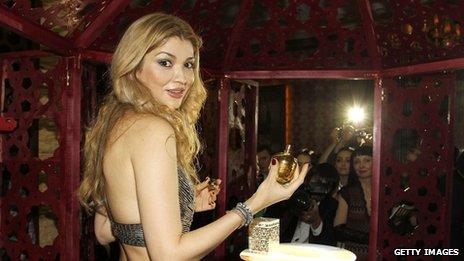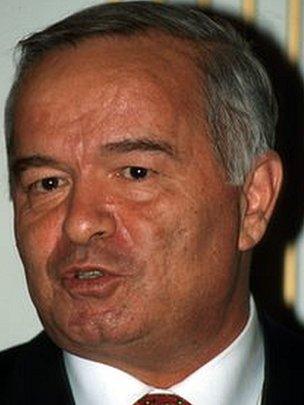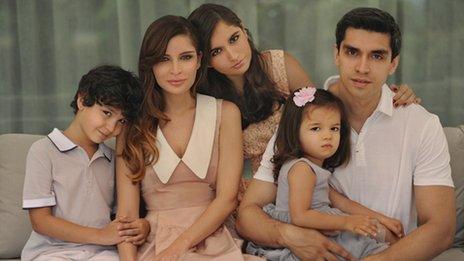Gulnara Karimova: Uzbek leader's daughter wages Twitter war
- Published

Gulnara Karimova's interests have come under pressure in Uzbekistan
Dubbed the "Princess" of Uzbekistan, Gulnara Karimova is known both for her pop star image as well as her political ambitions.
But an apparent fall from grace has seen her lift the lid on the secretive politics of one of Central Asia's most authoritarian states.
Viewed until recently as a potential successor to her father, the publicity savvy Ms Karimova has been using the micro blogging site Twitter to attack key figures and institutions of the Uzbek regime.
Her unprecedented actions come in response to moves apparently aimed at curbing her influence.
Apart from her artistic ventures, which have included a pop video with French actor Gerard Depardieu, Ms Karimova has built a reputation as a powerful businesswoman.
She has been closely associated with several TV and radio channels which routinely portray her as a philanthropist and patron of the arts.
Through her Fund Forum organisation Ms Karimova has organised a steady stream of public events, from charity mass weddings to the annual StyleUz art festival.
Blackout
But her pervasive media presence has taken a sudden nosedive.
Last month a handful of TV and radio channels close to Ms Karimova stopped broadcasting. One media group was put under investigation on suspicion of financial wrongdoing.
The media blackout also hit Ms Karimova's showpiece event - the annual StyleUz festival - usually graced by international stars; both Jose Carreras and Sting have performed in the past.

Gulnara Karimova has built her own 'Guli' fashion brand
But in contrast to the routine headline coverage of past years, state media gave the 2013 event the cold shoulder.
On top of that, the singer Lara Fabian pulled out after being criticised for agreeing to perform in a country known for human rights abuses.
The Fund Forum organisation running the event, and which Ms Karimova chairs, has since come under pressure from financial regulators.
Tweeting back
In response Ms Karimova has lashed out on Twitter, an unprecedented move in the secretive country where the media are tightly controlled.
In a tweet from 13 November she claimed that men with assault rifles had ransacked the youth studio of one of the closed TV stations.
"People were beaten up," she wrote, adding that young people had been intimidated with fabricated cases of sabotage and anti-government sentiments.
But her most astonishing comments came when she accused the country's powerful security chief, Rustam Inoyatov, of masterminding the hostility against her and of aiming for the country's top post.
Responding to a tweet asking her if Rustam Inoyatov would seek the presidency, she tweeted: "He will! He is already fighting for it!"
She also accused Mr Inoyatov of threatening her and stopping her from running for president.

President Islam Karimov has ruled Uzbekistan for over 20 years
"This is what he said," she wrote. "We will not touch you if you lie low."
In other tweets Ms Karimova alleged that the security service is using threats, beatings and forced confessions, even against its own officers.
"They have already beaten up staff members to force them to confess to actions they did not commit," she wrote on 4 November, giving details of the beating of one officer who she claimed had his ribs broken.
She also wrote that officers had been targeted for blowing the whistle on illegal activities in the security apparatus such as drinking at work, racketeering and smuggling alcohol and cigarettes.
Such allegations chime with accusations by human rights bodies who say torture and mistreatment are systematic in Uzbekistan's justice system, something regime figures routinely deny.
Power struggle
Observers say the public outpourings have brought into the open an intensifying rivalry within the Uzbek elite with the question of who will replace 75-year-old President Karimov looming large.
Ms Karimova has long been seen as a leading contender, but a series of problems at home and abroad have undermined her.
Last year her name became embroiled with a wide-ranging money-laundering and bribery investigation in Sweden and Switzerland after several of her close associates became suspects.
This year the probe came closer to home with reports that her properties in France had been searched as part of the investigations.
In September her troubles became personal when her younger sister, Lola Karimova-Tillyaeva revealed in comments to the BBC that the siblings had not spoken for years and the family was deeply divided.
Miss Lola Karimova-Tillyaeva also gave short shrift to her sister's chances of becoming president.

Lola Karimova-Tillyaeva has said she and her sister have not spoken in years
In an apparent response Ms Karimova accused her sister and mother of engaging in sorcery.
More broadly she has blamed the negative headlines on enemies trying to blacken her name.
But she is now facing much more serious threats.
'Hellish job'
Ms Karimova has alleged that there were attempts to shut down her Fund Forum organisation and that people were collecting negative facts against her.
Given her place in a regime notorious for choking off civil society organisations, her defence of NGOs and free speech seems startling.
"What kind of NGO's can operate in the country then? Maybe only docile and silent ones can?" she tweeted on 7 November.
Ms Karimova also wrote there had been attempts to poison her with mercury and that she was still receiving medical treatment.
The pressure has been telling.
Ms Karimova has distanced herself from any presidential ambitions, saying she was not interested in "that hellish post".
More recently she tweeted, "they want me to shut up already and leave".
Johannes Dell, BBC Uzbek and BBC Monitoring contributed to this article.
- Published25 October 2013
- Published27 September 2013
- Published27 November 2012